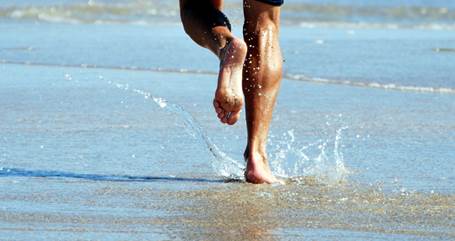Stay relaxed and focused during your
pre-race taper
Scaling back the Kays in the weeks leading
up to race day can leave many runners feeling restless and tempted to run to
calm themselves. But doing unscheduled workouts during the taper (the last two
to three weeks of your training) will only put your race at risk. So what’s an
anxious runner to do? “Use the time to get mentally prepared,” says Dean
Hebert, a certified running coach. The following tips will help reduce nerves
and hone mental skills you can use on race day.

Runners
expect to feel invigorated during the taper, and if they don’t, they worry
Trust the process
“Runners expect to feel invigorated during
the taper, and if they don’t, they worry,” says Cindra S. Kamphoff, PhD, an associate
professor in sports psychology who has presented a study on the marathon
taper’s mental effects at the Association for Applied Sport Psychology’s annual
conference. “Remind yourself that you’ll experience the benefits of this rest
period on race day.”
Focus on the finish
Prep your mind to get your through the
race. Hebert recommends this drill: Finish the last half kilometer or kilometer
of every workout fast, without stopping – not even a meter short then examine
what enabled you to do that. Did you focus on your form, use a power word,
bargain with yourself, or visualize reeling in runners? Use that same mental
tool on race day.

Finish
the last half kilometer or kilometer of every workout fast, without stopping
Picture success
“Neuroscience is finding that visualization
can re-programme the brain, creating a mental blueprint that directly aids
performances,” says Greg Chertok, director of sports psychology at a medical
and rehabilitation center. Spend five minutes daily creating a vivid image of
your ideal race see yourself on the course nailing your paces, taking in fuel,
tackling tough spots, and hitting your goal.
Study the course
The better you know the route, the more in
control and excited you’ll feel. If you live near the race, drive the route or
do some training runs on it. If you’re travelling, review course maps, watch
video tours, and read blogs and stories about the race to gain a stronger sense
of the event.

Spend
five minutes daily creating a vivid image of your ideal race
Minimize stress
Runners with high reserves of emotional
energy respond better to the pressures of racing, says Chertok. So use the
taper to recharge. Get extra sleep. Postpone high-pressure meetings. Minimize
time with difficult colleagues or people who exhaust you, and spend time with
people around whom you can relax. And do activities you enjoy – reading, going
to the movies, cooking, down time with the kids.
Take care of business
With one week to go, decide what you’ll
wear, how you’ll get to the starting line, what your pre-race dinner and
breakfast will be, where to pick up your bib – all the logistical race details.
“Having this planned out provides a sense of control,” says Hebert. “The more
in control you feel, the more confidence you’ll have.”